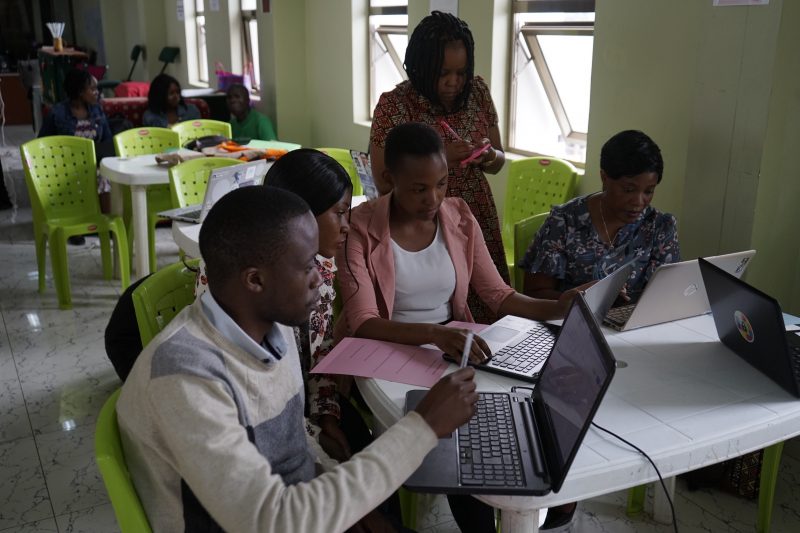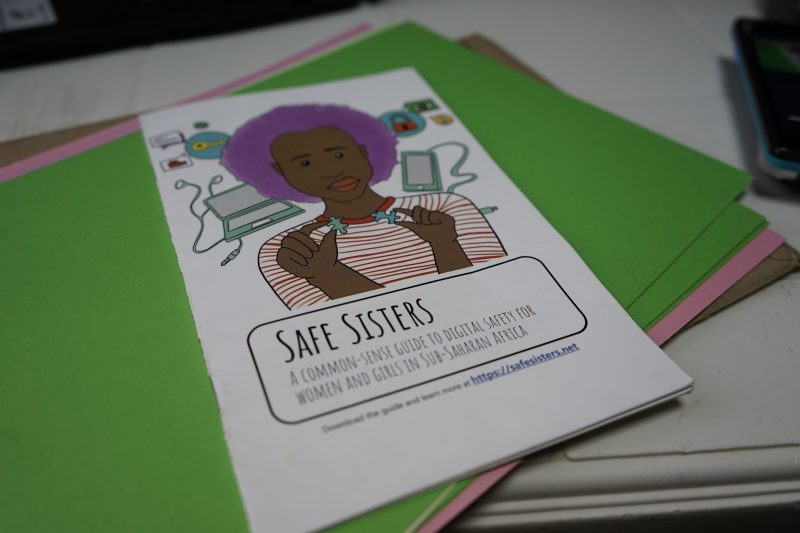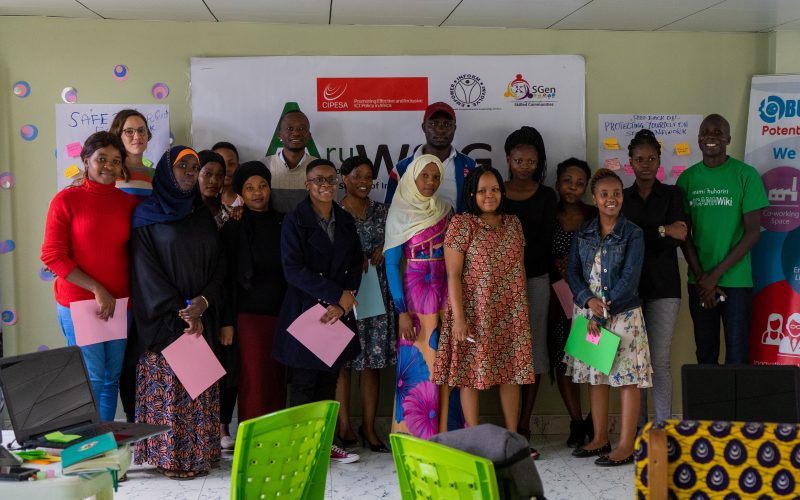
Zaituni Njovu of Zaina Foundation assists Localization Sprint participants working on the Safe Sisters digital safety guide. Photo provided by Erin McConnell of Localization Lab and used with permission.
Rising Voices is republishing articles from this series as part of a collaboration with Localization Lab. The original article written by Erin McConnell can be found on their Medium page.
When discussing access to the internet, information, and technologies the role that language plays in encouraging or inhibiting that access cannot be ignored. Recognizing this and the fact that the majority of online content and tools are available in English and not in local languages, organizers have hosted a full day Localization Sprint prior to each Arusha Women’s School of Internet Governance (AruWSIG). This year, the focus of the Localization Sprint was adapting digital safety educational materials for Swahili speakers.
The 2nd edition of the AruWSIG brought about 30 participants from across Tanzania to the feet of Mt. Meru. Over the course of 4 days, they learned about local and international internet governance and the challenges facing Tanzanians as they navigate the digital sphere and try to gain access to it.
Adapting Digital Safety Guides for Swahili Speakers
The localization sprint focused on 3 digital safety guides that address real and pressing needs for Tanzanian and Swahili-speaking netizens.
The Safe Sisters digital safety guide was developed through The East African Women’s Digital Safety Fellowship, for and by East African women. The guide emphasizes digital safety practices addressing some of the most common issues faced by women online: using social networks securely, creating strong passwords, securely sharing devices, and being aware of how information shared online can be monitored and collected by others.

The Safe Sisters digital safety guide. Photo provided by Erin McConnell of Localization Lab and used with permission.
The two Surveillance Self-Defense guides, How to Use WhatsApp on Android and Protecting Yourself on Social Media Networks, supplement the Safe Sisters guide by taking deeper dives into how to understand and use social media networks and WhatsApp more securely. Both guides were fully translated by sprint participants and once the guides have been fully reviewed, they will be formatted and shared on the Localization Lab website and distributed by partners and sprint participants.
Why Localize for Swahili Speakers?
Despite having such a large number of speakers and an official presence in East Africa, the amount of localized technology and original content in Swahili online is relatively small and efforts to further develop and standardize technical terminology — like that of the Open Swahili Localization Project — lack resources.
This lack of information in Swahili (and other regional languages) can contribute to a litany of challenges faced by East African users as they enter into and interact in the digital sphere. Maybe of most concern is how it can affect already marginalized populations. The continued gender gap affecting womens’ access to technology and the internet was one issue highlighted by participants in an AruWSIG session on the feminist principles of the internet, hosted by Rebecca Ryakitimbo, Founder and Programs Manager of KSGen. Participants shared that the lack of content in Swahili and other local languages disproportionately kept women from obtaining technical literacy, access to the internet, and to information.
“Language is very key with the issue of connectivity,’’ said Ms. Ryakitimbo. She then asked the room how much information on family planning and medical issues was available in Swahili and local languages.
The issue of accessibility was echoed by other sprint participants, and was highlighted by Zaituni Njovu as she introduced the Localization Sprint:
“Some people cannot access content online because it is in English or in other languages. We are empowering Swahili speaking people to use the internet.”
When asked why they were personally motivated to participate in the Localization Sprint, another participant stated, “Our whole life is online and our 1st language is Swahili.” While many Tanzanians do speak English, the majority speak Swahili and access to English language education is largely determined by an individual’s financial resources.
“We need [content in Swahili] for user protection,” shared an attendee, emphasizing the need to break down language barriers for users, particularly around terms of service and privacy settings. “We are part and parcel of these technologies, including social networks,” added Diana Damson, an ICT Law student at Iringa University. “If something goes wrong, we are affected.”

Photo by InHouse Pictures, an Arusha, Tanzania based photography and design firm and used with permission.
For sprint participants, making technology and more online content available in Swahili was about more than basic access. It was also clear that expanding the presence of Swahili in the digital sphere had cultural and sentimental value. Zaituni Njovu shared:
“It is our culture. It is one of our cultures…People feel more comfortable when they use [content] online in their native language”
Technical Terminology and a Case Against Borrowed Words
Across the board, technical terminology in Swahili was shared as both a challenge and takeaway.
The majority of localization sprint participants shared that their biggest takeaway was becoming familiar with new terminology in Swahili and being able to talk about digital safety without relying as heavily on borrowed words from English. One participant added:
“It’s important to localize into Swahili and learn new terms in Swahili. At times we were using English terms to explain English to someone who speaks Swahili.”
Not all localization sprint attendees were ideologically aligned when it came to use of technical terminology in Swahili however. A few participants shared that using Swahili translations could make it more complicated for users who already have familiarity with English terms. They reported that some technical translations in Swahili, though following Swahili word formation norms, can be confusing or even appear nonsensical.
The overwhelming consensus of facilitators and participants was that using Swahili, and avoiding borrowed terms was the best approach. Translation should follow the standards set by projects like the University of Dar es Salaam’s Open Swahili Localization Project as well as the University of Zanzibar, one of the premier institutions for Swahili expertize according to event facilitator Bonface Witaba of the Centre for Youth Empowerment.
Diana Damson broke down her dedication and the responsibility of Swahili speakers to localize, despite the challenges:
“Changes need time. We need to be patient. We can’t give up. Going back to English will not help us. We need to put in more effort to make our language keep up with technical development.”
Special thanks to Bonface Witaba and Rebecca Ryakitimbo for organizing the 2nd edition of AruWSIG and inviting the Localization Lab to co-facilitate the Localization Sprint with the inspiring Zaituni Njovu.



